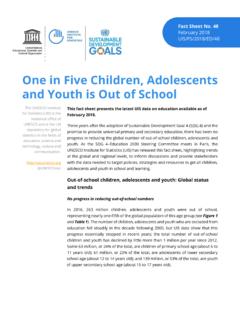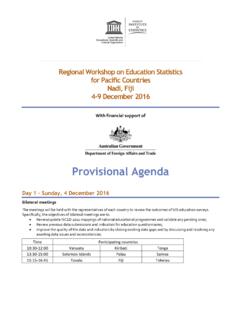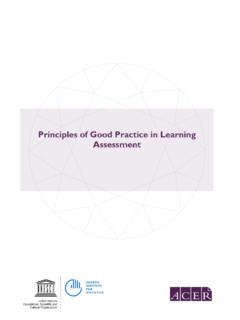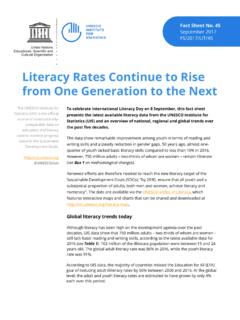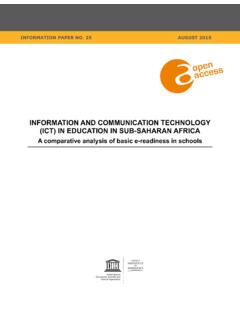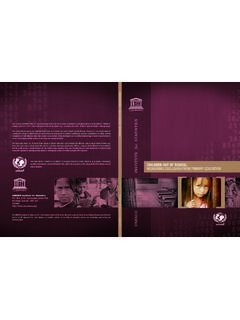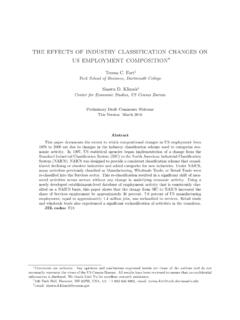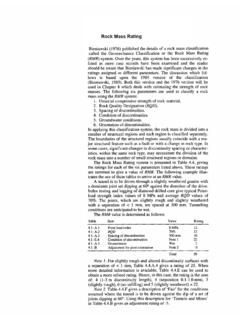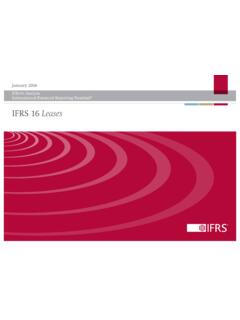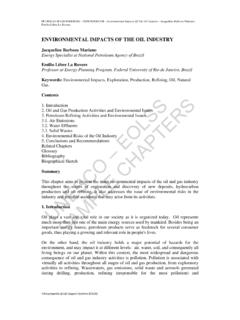Transcription of FCS 2009 FINAL8 - UNESCO
1 The 2009 UNESCO framework for Cultural Statistics establishes a conceptual model for defining culture for statistical purposes. It is a tool for organizing and collecting comparable cultural data. As a classification instrument, it applies taxonomies of activities, goods and services from recognized international standard classifications to cultural statistics. The 2009 framework was developed through extensive consultations with Member States, experts on cultural statistics and policies, as well as representatives from international organizations. It reflects global changes in technology, our understanding of fundamental cultural issues, advances in measurement, and transformations in cultural policy priorities that have occurred since the 1986 version.
2 This instrument will serve as a stimulus for the improved measurement of cultural phenomena and the promotion of cultural statistics worldwide to support effective evidence-based policymaking. Ultimately, it will lay the foundations for new methodologies, data collections and indicators developed by the UNESCO Institute for Statistics (UIS), as well as for UNESCO actions in the field of UNESCO Institute for Statistics (UIS) is the statistical office of the United Nations Educational, Scientific and Cultural Organization ( UNESCO ) and is the UN depository for internationally comparable statistics in the fields of education, science and technology, culture and UNESCO framework FOr CUlt Ural StatiSti CSUNESCO iNStitUtE for StatiSti CS 2009 UNESCO framework FOr CUlt Ural StatiSti CS26952695 UNESCO Institute for Box 6128, Succursale Centre-VilleMontreal, Quebec H3C 3J7 THE 2009 UNESCO framework FOR CULTURAL STATISTICS (FCS) UNESCO The constitution of the United Nations Educational, Scientific and Cultural Organization ( UNESCO )
3 Was adopted by 20 countries at the London Conference in November 1945 and entered into effect on 4 November 1946. The Organization currently has 193 Member States and 7 Associate Members. The main objective of UNESCO is to contribute to peace and security in the world by promoting collaboration among nations through education, science, culture and communication in order to foster universal respect for justice, the rule of law, and the human rights and fundamental freedoms that are affirmed for the peoples of the world, without distinction of race, sex, language or religion, by the Charter of the United Nations.
4 To fulfil its mandate, UNESCO performs five principal functions: 1) prospective studies on education, science, culture and communication for tomorrow's world; 2) the advancement, transfer and sharing of knowledge through research, training and teaching activities; 3) standard-setting actions for the preparation and adoption of internal instruments and statutory recommendations; 4) expertise through technical co-operation to Member States for their development policies and projects; and 5) the exchange of specialized information. UNESCO is headquartered in Paris, France.
5 UNESCO Institute for Statistics (UIS) The UNESCO Institute for Statistics (UIS) is the statistical office of UNESCO and is the UN depository for global statistics in the fields of education, science and technology, culture and communication. The UIS was established in 1999. It was created to improve UNESCO 's statistical programme and to develop and deliver the timely, accurate and policy-relevant statistics needed in today s increasingly complex and rapidly changing social, political and economic environments. The UIS is based in Montreal, Canada. Published in 2009 by: UNESCO Institute for Statistics Box 6128, Succursale Centre-Ville Montreal, Quebec H3C 3J7 Canada Tel: (1 514) 343-6880 Fax: (1 514) 343-5740 Email: ISBN 978-92-9189-075-0 Ref: UIS/TD/09-03 UNESCO -UIS 2009 - iii - Foreword The 2009 UNESCO framework for Cultural Statistics (FCS) is a collaborative effort by the UNESCO Institute for Statistics (UIS) and the UNESCO Culture Sector.
6 Based on the 1986 framework for Cultural Statistics, this revised version of UNESCO s cultural statistics methodology takes into account new concepts that have emerged since 1986 in the field of culture, including those related to new technologies which have so drastically transformed culture and the ways it is accessed intangible heritage, and evolving cultural practices and policies. Culture plays a key role in all societies around the world, influencing various facets of peoples lives, from leisure to professional activities.
7 The role of culture in development has also recently emerged as an important policy issue. However, preserving and respecting the specificity of each individual culture as well as the distinctive qualities of other cultures is the challenge that must be met globally. In order for evidence-based policies to be formulated and for their impacts to be measured and evaluated, reliable information is needed. With this in mind, UNESCO recognized the need to update its 1986 framework for Cultural Statistics, which was based on a formal and static notion of culture that does not reflect the current more inclusive approach and the priorities of developing countries.
8 In addition, the new framework provides a conceptual foundation and methodology to enable the production and dissemination of internationally comparable cultural statistics. This revised version is the result of a comprehensive four-year global consultation. A large number of individual experts, scholars, statisticians, UNESCO Member States and international organisations contributed to its development. The numerous and varied input from the different participants proved invaluable to the creation of this methodology, providing new and diverse perspectives on culture and cultural statistics.
9 The 2009 FCS has been designed as a methodology for international and national application. Its main goal is to facilitate international comparisons through a common understanding of culture and the use of standardized definitions and international economic and social classifications. Through this project, UNESCO hopes to encourage investment in cultural statistics. Data and statistics are urgently needed by Member States, international agencies and non-governmental organisations to better measure the impact and relevance of cultural policies and programmes.
10 We trust that the 2009 framework for Cultural Statistics will contribute to the improved measurement of the economic and social impacts of culture. Hendrik van der Pol Fran oise Rivi re Director, UNESCO Institute for Statistics UNESCO Assistant Director-General for Culture - iv - Acknowledgements The 2009 UNESCO framework for Cultural Statistics (FCS) was prepared by Jos Pessoa and Lydia Deloumeaux of the UNESCO Institute for Statistics (UIS) under the overall direction of Simon Ellis. It is based on an initial report produced for the UIS by the consultancy team of Richard Naylor and Paul Owens (BOP Consulting), Andy Pratt (London School of Economics) and Calvin Taylor (University of Leeds).
